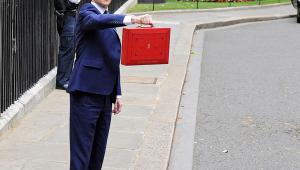The public sector is bracing itself for prolonged austerity as Osborne blames a worsening global economic backdrop and a “dangerous cocktail of risk” faced by the UK.
The decision to pursue further spending cuts also came as Osborne admitted he had missed a target for reducing government debt and as the Office for Budget Responsibility revised the UK’s growth down to 2.0% for 2016, down from 2.4% in the Autumn Statement.
“The OBR now tells us the world has become more uncertain,” the chancellor said. “So we have two options. We can ignore the latest information, and spend more than the country can afford. That’s precisely the mistake that was made a decade ago.
“Or we can live in the world as it is, and cut our cloth accordingly. I say we act now, so we don’t pay later.”
The savings will be achieved by a further “drive for efficiency and value for money” undertaken by chief secretary to the Treasury Greg Hands and paymaster general Matthew Hancock.
“At less than half a percent of government spending in four years’ time, that is more than achievable,” Osborne said, adding that it would still be possible to protect resources for the NHS, schools, infrastructure and security.
The chancellor said the latest spending plans – along with a variety of indirect cuts and taxes – will keep the government on track to meeting his self-imposed target of achieving a surplus by the end of this parliament.
One such indirect cut is the revaluation of public sector pensions, with employers’ contributions set to rise as a result.
Responding to the announcement on higher employer contributions for public sector pensions, CIPFA chief executive Rob Whiteman said this is “a stealth cut – meaning money is diverted from services back to the Treasury”.
Jonathan Clifton, associate director for public services at the Institute for Public Policy Research (IPPR), noted that these pension changes undermine the chancellor’s pledge to protect health and education. “He is loading more pressure onto these services via the back door,” Clifton said. “An additional £2bn worth of savings will come from public sector pensions. These pension changes will fall on all public sector employers – including schools and hospitals – which are meant to be protected from spending cuts. They will find it even harder to balance the books in the coming years.”
Local authorities finances will also suffer indirectly from cuts to business rates announced during the Budget. Many councils rely heavily on business rates income, following the abolition of core grants from Whitehall.
Commenting on the budget, Public and Commercial Services Union general secretary Mark Serwotka said fears that Osborne posed a “serious risk” to Britain’s economy had come to fruition, with the Tories failing to meet their own targets and continuing to pursue cuts “as a political choice rather than economic necessity”.
“Further cuts to civil service departments would be devastating, as tens of thousands of jobs are already under threat and hundreds of offices are earmarked for closure, hitting vital services from tax collection to our justice system,” Serwotka said.
Catherine Colebrook, chief economist at the IPPR, agreed that today’s announcements mean it will be even harder for councils to maintain existing public services.
Colebrook, joining many other commentators, said the chancellor should have chosen a different route, taking advantage of the currently low cost of borrowing.
Instead, the chancellor said he plans to restrict borrowing to less than half of what the UK needed in 2010, aiming for £72.2bn in 2015/16 compared to the “unsustainable” £150bn per year borrowing rate in 2010. He added that he aims to borrow £1 in every £14 spent, compared to £1 in every £4 when he became chancellor.



















